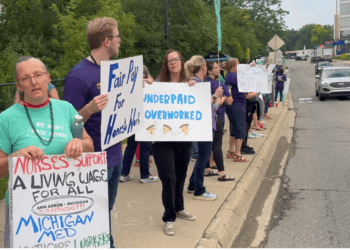Michigan has stopped issuing new housing choice vouchers, a program also known as Section 8, due to a federal funding shortfall.
The Michigan State Housing Development Authority, which administers the Housing Choice Voucher program, received federal funding in May that is “short of keeping up with rising costs in Michigan,” a news release said. As a result, the state agency cannot issue new vouchers and closed the waitlist to new applicants, including to those experiencing homelessness.
“At a time when Michigan is gaining traction in addressing our housing challenges, this reduction in funding will only take us backward and make things worse for our most vulnerable neighbors,” said Michigan State Housing Development Authority Chief Executive Officer and Executive Director Amy Hovey in a statement.
It’s important to note, the budget shortfall will not impact anyone who is currently receiving housing choice vouchers.
“We’re not removing folks from the program. It’s just we’re very limited at this time,” said Lisa Kemmis, the Michigan State Housing Development Authority’s director of rental assistance, during a July webinar on the budget shortfall.
Related: After years of waiting, Michigan Section 8 renters race to find housing
Nearly 58,000 Michigan families who are low-income use federal housing vouchers with about half, 28,000, getting their vouchers from MSHDA. The average income for Michigan voucher-holders is $12,672. Through the program, families contribute at least 30% of their income toward rent while public housing authorities give federal dollars directly to landlords.
Only MSHDA’s waitlist is paused during the budget shortfall with about 85,000 people remaining on the list.
“Drawing names and issuing vouchers will most likely be on hold for the remainder of 2024, and possibly into early 2025,” Kemmis said during the webinar.
Michigan saw a 6% drop in funding for the program this year when comparing current housing costs with funding from the U.S. Department of Housing and Urban Development, according to MSHDA. This funding level is “insufficient” to meet housing needs across the state.
“We will collaborate with HUD to monitor expenses and explore cost-saving measures within the HCV (housing choice voucher) program, but it’s ultimately up to Congress to address this shortfall before it exacerbates housing insecurity and homelessness in our state and across the country,” Hovey said.
The state attributes the funding shortfall to rising housing costs, which have increased MSHDA’s average monthly payments to landlords. Rent costs across the United States hit record highs two years ago. The rental market has started to cool this summer, according to Redfin analysis, but “despite the slight dip, affordability is still a serious issue for renter households.”
To cover the climbing costs, Michigan received a 10% boost in funding last year to the housing choice voucher program, according to Kemmis. But by the fall, MSHDA stopped drawing names from the waitlist as monthly costs kept going up. A federal dashboard shows Michigan has exceeded its voucher budget since August 2023.
“As families’ income levels decrease, our portion of the rent increases,” Kemmis said. “Balancing those items, we determined we needed to take some initial actions to slow down our leasing activity to ensure we didn’t have too many vouchers out in circulation that could not be supported with our funding.”
By May this year, Michigan received its calendar year budget and was notified of the gap in funding. It then paused issuing new vouchers as of July 1.
“The shortfall meaning that our projected cost for 2024, we’re gonna far exceed our 2024 funding that HUD obligated to us was going to be,” Kemmis said.
Related: Without new housing vouchers, shelters worry homelessness will get worse
Although Michigan cannot draw names from the waiting list for the foreseeable future, new vouchers can still be issued through the Project-Based Voucher program, Veterans Affairs Supportive Housing program and Stability Voucher program. Additionally, local public housing authorities can still issue vouchers depending on their own program funding. Albion, for example, plans to open its waitlist from Sept. 9 through Sept. 13.
The state says the impact of the budget shortfall will be felt the hardest by those experiencing homelessness or housing instability. Nearly half of the families who have received a voucher from MSHDA were homeless when they were admitted to the program.
People experiencing homelessness are given priority when vouchers become available, but any pending applications will expire.
MSHDA will provide Housing Assessment and Resource Agencies throughout the state with a list of families who will be impacted by the expiring homeless preference applications. The state is also directing people to those agencies so they can tap into other housing resources that are available during this time.
“We recognize this situation is not ideal,” Kemmis said. “And we plan to take this time to consider other opportunities for changes in processes and procedures to best align with our goal of assisting those most in need.”
Source link : http://www.bing.com/news/apiclick.aspx?ref=FexRss&aid=&tid=66dc9131468a488d9a52f552bd0c419d&url=https%3A%2F%2Fwww.mlive.com%2Fpublic-interest%2F2024%2F09%2Fmichigan-stopped-issuing-section-8-housing-vouchers-closed-waitlist.html&c=18406363381085353953&mkt=en-us
Author :
Publish date : 2024-09-07 06:19:00
Copyright for syndicated content belongs to the linked Source.






